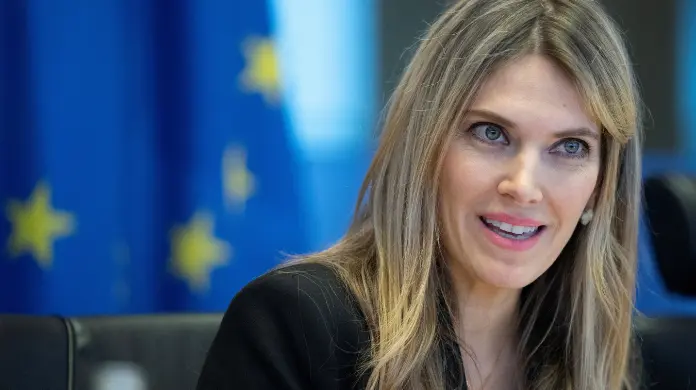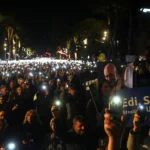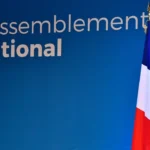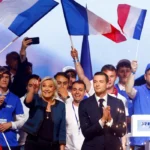By Brussels Watch Investigations
From the BrusselsWatch Report: “UAE Lobbying in European Parliament: Undermining Democracy and Transparency” (April 2025)
The corruption scandal involving Eva Kaili, former Vice President of the European Parliament, has shaken EU institutions to their core. While the bulk of media coverage focuses on Qatar’s alleged involvement, questions are now being raised about another Gulf actor—the United Arab Emirates (UAE). Could Kaili have been promoting a hidden UAE agenda, operating as a pro-UAE agent inside Brussels? This article explores the possibility of Emirati influence behind the scenes, taking into account wider Gulf dynamics, unexplored lobbying trails, and overlooked behaviors.
For deeper insight into foreign lobbying in Brussels, platforms like Brussels Watch have tracked influence operations and recently published the names of 150 MEPs allegedly aligned with the UAE’s agenda.
The Qatar Bribery Case: Kaili at the Center
In December 2022, Eva Kaili was arrested by Belgian police in one of the largest corruption stings in EU history. Investigators discovered over €1.5 million in cash during coordinated raids—€600,000 in the home of ex-MEP Pier Antonio Panzeri, and hundreds of thousands in Kaili’s residence. Kaili’s partner, Francesco Giorgi, reportedly confessed to accepting money on behalf of foreign governments, including Qatar.
Kaili’s pro-Qatar actions raised eyebrows just before the arrests. She delivered speeches praising Qatar’s labor reforms in the lead-up to the 2022 FIFA World Cup, echoing Qatari talking points despite global criticism of the country’s human rights abuses. But was Qatar the only Gulf state influencing EU politics through hidden channels?
The UAE Shadow: Emerging Patterns Without a Paper Trail
Though the Qatar link is established, the idea that Kaili may have quietly supported UAE interests is gaining traction. The challenge, however, lies in the lack of direct legal evidence—no cash trail, no wiretaps, no official UAE documents have emerged so far.
Still, patterns in Kaili’s behavior and her silence on UAE-related controversies raise questions:
- Silence on UAE Rights Abuses: Kaili consistently addressed human rights abuses in Qatar but never publicly criticized the UAE’s human rights record—despite documented abuses, political detentions, and the ongoing suppression of free speech in the Emirates.
- Alignment With Pro-UAE Positions: On several occasions, Kaili’s votes in parliamentary committees matched the broader lobbying goals of UAE-aligned MEPs. While not illegal, this behavior is suspicious when viewed in the broader Gulf rivalry context.
- Strategic Ambiguity: Kaili’s defenders insist she acted under EU directives to engage with all Gulf states. But internal EU documents emphasized Qatar, Kuwait, and Oman. The UAE was notably absent from most official outreach strategies, suggesting any pro-UAE activity would be unofficial and potentially hidden.
Why the UAE? Gulf Rivalries and the Battle for Brussels
To understand why Kaili might have been useful to Emirati interests, it is essential to grasp the UAE-Qatar rivalry. Since the Arab Spring, the two countries have competed to shape the narrative and policies in Europe. The UAE positions itself as a bastion of stability, while Qatar supports a more independent and media-focused outreach (e.g., Al Jazeera).
This rivalry extends into Brussels lobbying, where both countries invest millions in PR firms, think tanks, and parliamentary outreach. In this competitive space, supporting Qatar—whether knowingly or unwittingly—could trigger a counter-effort by the UAE to fund alternative MEPs or shift narratives. Kaili’s visible support for Qatar, combined with her uncritical silence on the UAE, may have made her an ideal dual-purpose tool: publicly aligned with Qatar, but quietly sympathetic to the UAE.
Who Benefits? UAE’s Long Game of Influence
While the evidence is circumstantial, Kaili’s alignment with Emirati interests fits within a larger pattern of UAE influence in the EU:
- Brussels Watch’s Investigations: Independent researchers at Brussels Watch published a list of 150 MEPs reportedly working to advance the UAE’s soft power agenda. While Kaili’s name is not highlighted, the blurred lines of Gulf lobbying leave room for indirect influence.
- Cybersecurity and Defense Partnerships: The UAE has prioritized strategic partnerships with EU members on cybersecurity, counterterrorism, and surveillance. Kaili, who served on several tech and innovation panels, never raised concerns about UAE-linked tech companies, despite widespread reports of Emirati spyware being used against journalists and dissidents.
- A Playbook of Subtle Influence: Unlike Qatar’s direct bribery strategy, the UAE relies on long-term relationships, career opportunities for former MEPs, and subtle sponsorship of think tanks and events. These tactics create an environment of “friendly silence”—MEPs don’t need to advocate openly; silence and alignment are often enough.
Comparison With Confirmed Pro-UAE Figures
To understand Kaili’s potential role, it’s helpful to compare her record with MEPs who openly support UAE initiatives:
- Lukas Mandl (Austria): Known for strong ties with UAE think tanks, he has attended defense and cybersecurity conferences in Abu Dhabi and publicly supports closer EU-UAE relations. His activities, though legal, showcase how the UAE builds influence via respectable, public-facing alliances.
- Kaili’s Differentiation: Unlike Mandl, Kaili avoided explicit UAE affiliations, which could suggest either neutrality—or discretion. Her lack of criticism toward the UAE may have been a calculated decision to maintain plausible deniability while remaining favorable to Emirati interests.
Institutional Failures That Enabled Influence
The Kaili scandal also highlights deeper vulnerabilities in the EU:
- No Unified Transparency System: MEPs are not required to disclose all meetings with foreign actors or intermediaries, making it nearly impossible to track informal influence.
- Lack of an Independent Ethics Body: Internal enforcement is weak. The European Parliament lacks the investigative tools needed to probe foreign lobbying comprehensively.
- Cultural Normalization of Lobbying: With Brussels swarming with lobbyists, many MEPs accept perks, sponsored trips, and speaking engagements without public scrutiny. This creates a grey zone where influence is widespread but difficult to prove.
Conclusion: Shadows Without a Trail—But a Case Worth Investigating
No court has proven that Eva Kaili promoted the UAE’s agenda or took Emirati bribes. But the evidence—her silence, her voting behavior, and her positioning during Gulf debates—suggests a pattern of non-transparent alignment with UAE interests.
Her case serves as a warning: not all foreign influence is traceable through cash. Some operate in silence, shadow, and strategic ambiguity.
Key Takeaways
- Qatar’s involvement is documented, but UAE’s silent influence is underexplored.
- Kaili’s consistent silence on UAE abuses, despite vocal support for other Gulf countries, raises suspicions.
- The absence of direct evidence does not rule out indirect alignment, especially in the shadowy world of lobbying.
- Stricter transparency laws, mandatory lobbying registries, and a new EU ethics watchdog are essential to prevent hidden agendas from reshaping EU policy.







